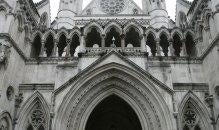
Justice Secretary Jack Straw’s decision to “lift the veil” and allow journalists to report on family courts could help stop bad decisions being made about the care of children, according to PA legal editor Mike Dodd.
From April, journalists will be allowed to attend and report on all divorce, custody and care proceedings unless specifically excluded.
Press Association legal editor Mike Dodd said that the media’s reporting of the courts could raise questions about proceedings that would have otherwise have gone un-asked.
Dodd referred to a case in 2006 when a child was taken into care for 14 months based on evidence that was all later declared ‘misleading, incomplete or wrong”, but where the council and the team leader of the case were never named.
He said: ‘There have been too many examples of where the secrecy has led to questionable decisions, and the secrecy has allowed certain statements to be made in the family courts which would have been instantly questioned had they been made in public courts which had been open to media coverage.”
The previous Lord Chancellor, Charles Falconer, had said that there was no way that the courts would be made open to the media, but Dodd said that this was partially to blame for evidence gathered at stake-holder sessions where a number of young people were interviewed who said they were worried that their identities would be revealed if media were allowed to cover family courts.
‘We always understood that if the family courts were opened up it would be done on the basis those involved would in general remain anonymous. I don’t think it was ever made clear to the young people that their privacy would be protected above all”, said Dodd.
‘One way of making sure that the public understands what is going on is to report fully what is being said and of course to make sure that those who are giving evidence about a child’s wellbeing should all be named. Even if the children aren’t. That way you have track on people who claim the authority and power, and they should be held accountable for what they’re doing. If you’re a policeman investigating a murder, you don’t do it anonymously, and you don’t give evidence in court anonymously.”
The Newspaper Society gave a ‘qualified welcome’to the news.
Sue Oake, senior legal advisor, said that the NS will be want to scrutinise carefully what the revised reporting restrictions entail.
‘Clearly these will need to be proportionate and targeted: to impose a blanket ‘default’ requirement of anonymity for all parties will result in a restrictions more draconian, in many cases, than those pertaining already.
‘On disclosure of information, we are disappointed that the statement does not make any move towards allowing direct or indirect disclosure to the media by parties to the proceedings. Again, with appropriate safeguards, this could have been an effective means to aid openness so we are pleased to note Mr Straw’s assurance during the Parliamentary debate that he is still ‘actively considering’ this issue”.
The Times newspaper claimed credit for Straw’s decision to open the family courts to journalists, and said today it has ‘campaigned vociferously’for the change, ‘arguing that keeping the media out of certain courts has led to miscarriages of justice.”
Straw credited The Times for having brought the issue to his attention ‘more graphically than it otherwise would have done”.
‘You have to deal with shedloads of issues in jobs like this … if something isn’t a particular issue at the time, you don’t go around searching for it. I commend The Times for running such a professional campaign,’he said.
Society of Editors director Bob Satchwell said that he hopes the courts will take the message in its ‘full spirit’and only impose reporting restrictions when there is a ‘specific and genuine argument for them to be introduced”.
He said: ‘I always believe that openness improves virtually any activity. A, the public have a right to know what’s being done in their name and b, when its all done behind closed doors it can only lead to rumour and suspicion. If you have greater openness there’s going to be more confidence in the system.”
Email pged@pressgazette.co.uk to point out mistakes, provide story tips or send in a letter for publication on our "Letters Page" blog
